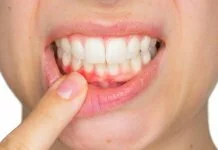Did you know that 87% of the population suffer from gum diseases? (as per the latest figures from IDA studies) Gum disease also known as Periodontal disease has a severe long term effect on your overall health. Experts say undiagnosed gum disease can cause you innumerable worries, and the sooner you get yourself treated for it, the better it is.

“Gum diseases are caused by poor oral hygiene, which causes bacteria to build up around and eventually multiply. This causes a reaction by the immune system and results into inflammation. Untreated gum disease may eventually lead to progressive loss in the alveolar bone around the teeth and are also responsible for many ill effects in the body,” said Lt. Gen. Dr. Vimal Arora, Chief Clinical Officer, Clove Dental.
Gum diseases can be classified as Gingivitis and Periodontists. The very first stage of gum disease is Gingivitis which if not taken care on time progresses to Periodontitis.
Periodontitis is a stage where inflammation of the gums results in bone and tooth loss. We have numerous bacterias present in our mouth, periodontitis make these bacterias stick to the tooth surface and pockets surrounding the tooth which eventually multiplies. This makes the infection grow to the extent that it becomes impossible to reach them with normal brushing and flossing.
Your body will try to fight the infection, in return the antibodies will also attack your healthy cells. The condition of your gums and underlying gums will be affected badly and will worsen. Periodontitis can recede your gums, damage your bone and also could be a major reason of tooth loss specially in adults.
There are many risks associated with prevalence of gum diseases; ranging from a symptomatic low grade fever to preterm and low birth weight in babies. This damaging process is mostly painless and more often than not, goes unnoticed.
Cardiac Health: Gum diseases can increase the chances of cardiac diseases, or worsening of the existing cardiac conditions.
Diabetes: Periodontal disease tends to be more severe in uncontrolled diabetes. Recent studies have shown that untreated periodontal disease makes it more difficult to control insulin needs of those with diabetes. A gum check-up might be called for if your diabetes is under poor control.
Pregnancy: The risk of periodontitis increases by 50% during pregnancy as women go through immense hormonal changes, particularly in the levels of Estrogen and Progesterone which may magnify the way gums react to excessive plaque or bacteria build up, even if the slightest infection is present. Bacteria can enter the bloodstream through the gums; can travel to the uterus, triggering the production of chemicals called prostaglandins, which are suspected to induce premature labour. If the mother has periodontal disease, there is a seven-fold chance of delivering a pre-term low birth weight baby. Even post-partum, prevalence of gum diseases might lead to problem in breast feeding as the mother will transfer her infection to the child.
Low-Grade Fever: When you have gum disease, every time you chew your food, certain amount of pus discharge from your gums is absorbed into the bloodstream. Body mechanism constantly fights against the unknown infection and affects the whole body. Due to infection one may have persistent low grade fever which may be difficult to diagnose, even by medical specialists. Lethargy and tiredness are common effects of gum diseases.
‘‘Gum diseases however, can be curbed effectively if it is diagnosed on time and consequently treated’’ added Dr Arora. Are you aware that a full blown gum disease causes ulceration of the ‘tooth attachment’ apparatus of all teeth equals to the surface area of one’s palm. You can well imagine, what will happen if an area approximately of your palm size is ulcerated in your body. Maintaining one’s oral health and hygiene by adopting positive oral habits like regular brushing of teeth, flossing and having regular dental check-ups can ensure positive oral health in the long run. By keeping your gum and teeth healthy, you can continue to enjoy the crunch of biting into an apple.
























